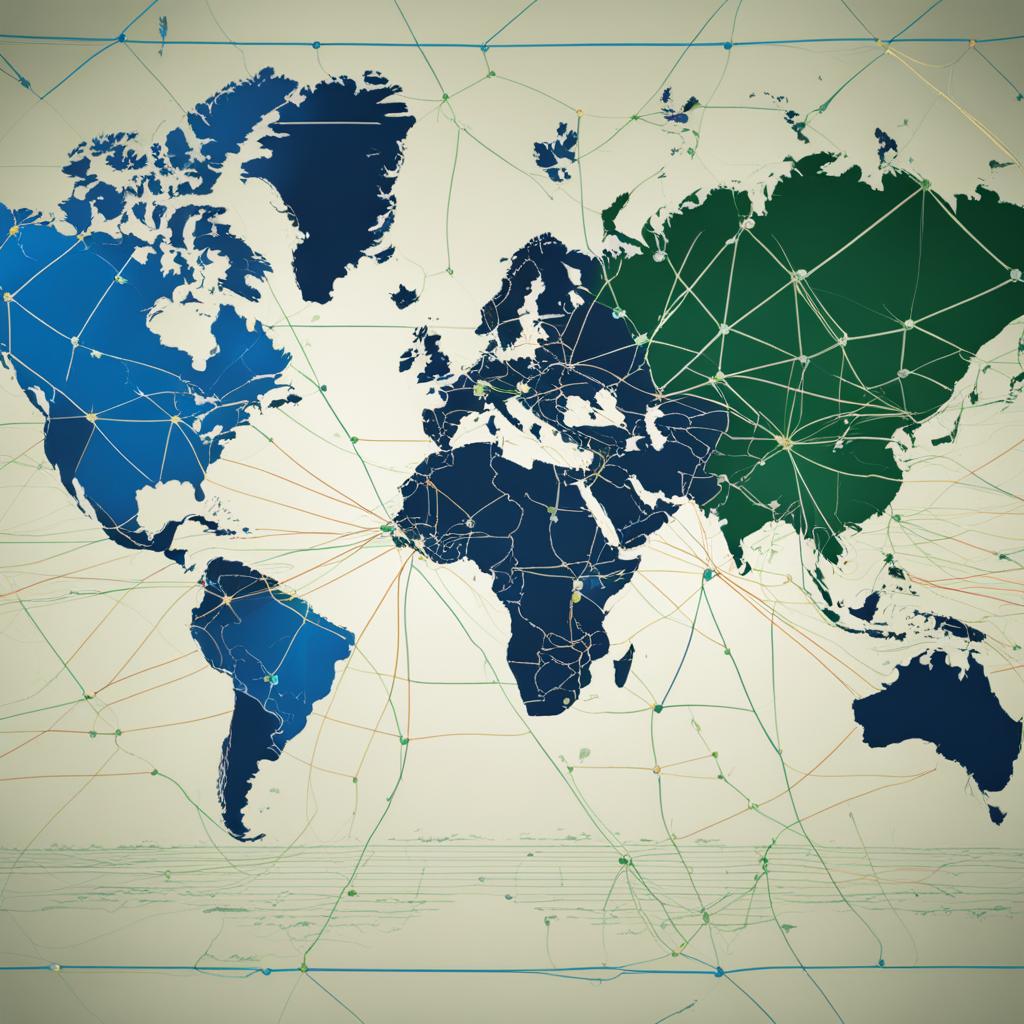Welcome to our article where we tackle the topic of economic nationalism and its impact on global trade. In recent years, economic nationalism has been on the rise, with countries prioritizing domestic industries over international trade. This approach can have consequences for not only individual nations but also the global economy as a whole.
When countries adopt economic nationalist policies, they typically focus on protecting their industries from competition from foreign imports. While this may help certain industries in the short term, it can also lead to a decrease in international trade and hinder economic growth. This is particularly relevant given the interdependent nature of the global economy where countries rely on one another for trade and investment.
Therefore, it is important to highlight the benefits of global economic cooperation and collaboration between nations. By working together, countries can create a more stable and interconnected global economy. This can be achieved through the promotion of multilateral trade agreements, negotiation, and diplomacy. It is crucial for nations to find a balance between protecting their interests and engaging in collaborative efforts to maintain a prosperous future for all.
Stay tuned as we delve deeper into understanding economic nationalism, its impact on the United States, and potential strategies for promoting global economic cooperation.
Understanding Economic Nationalism
Before we delve into the specifics of economic nationalism and its impact on global trade, let’s first define what it means. Economic nationalism is a term used to describe policies that prioritize domestic economic interests over international ones. It involves limiting imports and promoting exports to protect local industries and create jobs.
Proponents of economic nationalism argue that it helps prevent foreign competition from harming domestic businesses. They claim that it provides a level playing field and ensures that local industries have a fair chance to compete with international companies. Supporters also argue that economic nationalism can help maintain national security and reduce dependence on foreign countries.
On the other hand, critics of economic nationalism argue that it can lead to trade conflicts and hinder economic growth. They claim that it reduces competition and innovation, as businesses no longer need to compete to improve their products or services. Critics also argue that it can lead to higher prices for consumers, as domestic industries may have a monopoly on certain products or services.
Despite the ongoing debate, economic nationalism has gained traction in recent years, particularly in the United States. President Trump’s “America First” policy, which aimed to protect domestic industries and reduce the trade deficit, became a hallmark of his presidency.
The Rise of Economic Nationalism
The rise of economic nationalism can be traced back to the global financial crisis of 2008. As many countries experienced economic downturns, governments turned to protectionist policies to shield their economies. The trend continued as globalization and technological advances made it easier for companies to outsource jobs and relocate production to countries with lower labor costs.
In the United States, the decline of manufacturing jobs and the trade deficit with China fueled support for economic nationalism. Many Americans saw the loss of jobs and manufacturing plants as a threat to their way of life, and called for policies that would bring back jobs to the U.S.
The Trump administration’s trade policies, such as imposing tariffs on steel and aluminum imports and renegotiating trade deals, were seen as part of a larger effort to put “America First.” However, these policies also caused tensions with other countries, particularly China, and resulted in retaliation in the form of tariffs on U.S. goods.
The rise of economic nationalism has significant implications for global economic relations. In the next section, we will explore how it affects the United States in particular.
The Impact of Economic Nationalism on the United States
Economic nationalism has had a significant impact on the United States, shaping the country’s economic policies and trade relations with other nations. While proponents argue that it protects domestic industries and jobs, critics warn that it could lead to trade wars and hinder global economic growth.
Since the inception of the Trump administration in 2017, the U.S. has pursued an economic nationalist agenda, characterized by increased tariffs and trade barriers. For instance, the U.S.-China trade war saw both countries imposing tariffs on each other’s goods, resulting in higher consumer prices and disrupted supply chains. The U.S. has also renegotiated its trade agreements with Canada and Mexico, with a greater emphasis on protecting U.S. workers and industries.
However, the impact of economic nationalism on the U.S. economy is not uniformly positive. While certain industries, such as steel and aluminum, may benefit from protectionist policies, others, such as agriculture and tech, could suffer in the long run. Furthermore, tariffs and trade barriers may lead to retaliatory measures from other countries, harming U.S. exports and increasing costs for consumers.
It is also important to note that the U.S. is not immune to the effects of economic nationalism globally. As other countries adopt similar policies, the U.S. may face more competition and restrictions on its exports. This can affect industries that rely heavily on global trade, such as technology, services, and agriculture.
Impact on jobs and wages
Economic nationalism can potentially affect jobs and wages in the U.S. While it may protect certain industries, it can also lead to job losses in others. For instance, tariffs on steel and aluminum may benefit steelworkers and aluminum producers, but could raise prices for downstream industries that use those materials, leading to job losses in those sectors.
Similarly, trade barriers may protect jobs in domestic industries that face competition from imports. However, it may also lead to higher prices for consumers and reduced demand for U.S. exports, resulting in a decline in overall employment and wages.
Challenges for the U.S. economy
Adopting an economic nationalist approach also poses several challenges for the U.S. economy. Firstly, it can lead to trade conflicts and strained diplomatic relations with other nations, jeopardizing cooperation on other issues such as security and climate change.
Secondly, it can discourage foreign investment in the U.S. and increase costs for U.S. businesses that rely on global supply chains. This can have a ripple effect on the broader economy, as reduced investment and higher costs can lead to lower productivity and growth.
Furthermore, economic nationalism can undermine the effectiveness of multilateral trade agreements, creating uncertainty and unpredictability for businesses. This can discourage long-term planning and investment, hindering economic growth and job creation.

As seen in the graph, the U.S. GDP growth rate has fluctuated over the years, influenced by various factors such as global events and economic policies. Adopting an economic nationalist approach can potentially exacerbate these fluctuations and hinder long-term economic growth and stability.
In conclusion, economic nationalism has had a significant impact on the United States, shaping its economic policies and trade relations. While it aims to protect domestic industries and jobs, it also poses several challenges and risks for the U.S. economy. It is important for policymakers to carefully consider the potential consequences of adopting economic nationalist approaches and weigh them against the benefits of international cooperation and collaboration.
Fostering Collaboration: Promoting Global Economic Cooperation
At a time when economic nationalism seems to be on the rise, it is important to remember the benefits of collaborative efforts and the risks of protectionist policies. By promoting global economic cooperation, we can create a more stable and interconnected global economy that benefits all nations.
One of the key strategies for promoting collaboration is through multilateral trade agreements. These agreements can help to reduce trade barriers and promote free and fair trade among nations. They can also provide a framework for resolving disputes and addressing issues that may arise in the context of global trade.
The Importance of Negotiation and Diplomacy
Another way to foster collaboration is through negotiation and diplomacy. By engaging in dialogue and finding common ground, nations can work together to address shared challenges and opportunities. This can help to build trust and promote a sense of shared purpose, which is essential for long-term collaboration and cooperation.
Moreover, negotiation and diplomacy can help to prevent trade conflicts from escalating into full-scale trade wars. By using diplomatic channels to address concerns and find solutions, nations can avoid the negative economic consequences of protectionist policies and maintain stable economic relations.
The Role of International Organizations
International organizations and forums also play a critical role in promoting global economic cooperation. These organizations provide a platform for nations to collaborate and discuss issues that affect the global economy. They can also help to develop policies and guidelines that promote free and fair trade and address issues such as intellectual property rights and environmental protection.
For example, the World Trade Organization (WTO) serves as a forum for member nations to negotiate and enforce international trade agreements. The WTO also provides a platform for resolving trade disputes and promoting sustainable economic growth.
Cultivating a Culture of Cooperation
Ultimately, promoting global economic cooperation requires a cultural shift towards collaboration and empathy. Nations must recognize that their economic interests are interconnected and that collaboration is essential for long-term prosperity.
By cultivating a culture of cooperation and promoting policies that support free and fair trade, we can build a more stable and sustainable global economy that benefits us all.
Finding a Balance: Economic Nationalism and Global Trade
As we have explored in this article, economic nationalism can have both positive and negative effects on global trade. While it may protect domestic industries and create jobs, it can also lead to trade conflicts and hinder economic growth. Therefore, it is crucial for nations to find a balance between protecting their interests and engaging in collaborative efforts to maintain a stable and interconnected global economy.
At the heart of this balance is the need for open and transparent communication. By fostering dialogue, negotiation, and cooperation, we can pave the way for a more prosperous and sustainable future for all nations. This includes promoting multilateral trade agreements, such as the World Trade Organization, that are based on fair and reciprocal trade practices.
The Role of International Organizations
International organizations, such as the United Nations, World Bank, and International Monetary Fund, play a crucial role in promoting global economic cooperation. They provide a platform for nations to come together, share their concerns, and work toward common goals. These organizations also facilitate negotiations and help resolve conflicts that may arise from economic nationalism.
The Importance of Diplomacy
Diplomacy is also key in promoting collaboration and finding common ground among nations. By engaging in constructive dialogue and negotiation, we can prevent conflicts and find mutually beneficial solutions. Diplomacy can also help build trust and understanding between nations, which is essential in the increasingly interconnected global economy.




